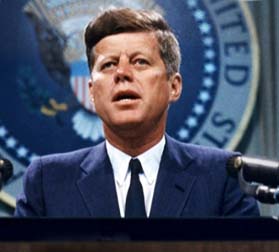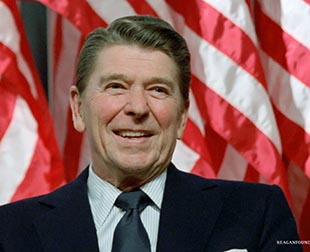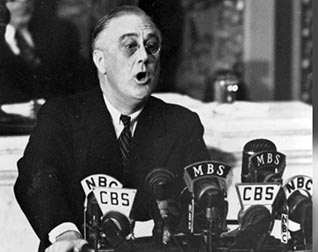
Table of Contents
My 4 Favorite Presidents




John Fitzgerald Kennedy
For a variety of reasons, JFK remains a vibrant figure a half century after his death. Perhaps the most important contributor to his "afterlife" in American culture was the then-nascent news medium of television. Kennedy became the first president to conduct live televised press conferences, and from those sessions, many Americans felt a stronger connection to the man occupying the White House. When he died, television was there, in a way that no other news medium could rival. With non-stop coverage, the three television networks produced a memorable weekend, cluttered with indelible images: broadcasters' initial scramble to get information, the chaos surrounding assassin Lee Harvey Oswald as he was led from one location to the next in the Dallas Police Department, the muffled drumbeats, the riderless horse, the brave widow, the adorable toddler saluting his father's casket, and more. Televisions joined the nation in one big congregation, mourning and stumbling through the following days in shock. And two days after the president's death, millions of stunned Americans watched the murder of his assassin, Oswald, on live TV. A week earlier, it all would have been unthinkable.
From the first moments of his presidency, Kennedy evoked a sense of security and a spirit of idealism which reassured Americans of their nation's strengths and inspired them to serve their country and the world. "And so, my fellow Americans -- ask not what your country can do for you -- ask what you can do for your country. My fellow citizens of the world -- ask not what America will do for you, but what together we can do for the freedom of man," Kennedy said in his inaugural address. Dazzled by his poise, moved by his eloquence, Americans proudly embraced the vigor and vision of their young president.
Kennedy's hard-line international diplomacy helped preserve Western democracy and may have prevented a catastrophic nuclear war, but it also heightened the tension between the superpowers. When Soviet Premier Nikita Khrushchev threatened to take West Berlin in 1961, Kennedy promised a military response, and the Russians backed down. When the Soviets began to install missiles in Cuba in late 1962, Kennedy demanded their removal, then skillfully transacted a diplomatic settlement which kept the two enemies at peace. Later, he negotiated a treaty to end atmospheric nuclear testing, the first nuclear weapons treaty in history.
Ronald Wilson Reagan
Ronald Wilson Reagan was a transformational President. His leadership and the symbiotic relationship he forged with Soviet leader Mikhail Gorbachev during their four summit meetings set the stage for a peaceful resolution of the Cold War. As the Soviet Union disappeared into the mists of history, Reagan's partisans asserted that he had "won" the Cold War. Reagan and Gorbachev more prudently declared that the entire world was a winner. Reagan had reason to believe, however, that the West had emerged victorious in the ideological struggle: as he put it, democracy had prevailed in its long "battle of values" with collectivism. British Prime Minister Margaret Thatcher, his staunch ally, wrote that Reagan had "achieved the most difficult of all political tasks: changing attitudes and perceptions about what is possible. From the strong fortress of his convictions, he set out to enlarge freedom the world over at a time when freedom was in retreat—and he succeeded." This is true as far as it goes—the number of democratic nations as well as the reach of free-market ideology expanded on Reagan's watch. But, as Russia's recent autocratic path suggests, the permanence of these advances remains in doubt.
Reagan's economic legacy is mixed. On the one hand, tax reduction and a tightening of interest rates by the Federal Reserve led to a record period of peacetime economic growth. On the other, this growth was accompanied by record growth in the national debt, the federal budget deficit, and the trade deficit. Defenders of Reagan's economic record point out that a big chunk of the deficit was caused by increased military spending, which declined after the Soviet collapse and created the context for balanced budgets during the Clinton years. Even so, the supply-side tax cuts did not produce the increase in revenues that Reagan had predicted. The economist Robert Samuelson has suggested that Reagan's main achievement in the economic arena was his consistent support of the Federal Reserve, which under Reagan's appointee Alan Greenspan, followed monetary policies that kept inflation low. Reagan also succeeded in a principal goal of reducing the marginal income tax rate, which was 70 percent when he took office and 28 percent when he left.
Reagan also left a monumental political legacy. After he was reelected in a 49-state landslide in 1984, it became clear that Democrats would be unlikely to return to the White House under a traditional liberal banner. This paved the way for Bill Clinton's centrist capture of the Democratic nomination and the presidency in 1992. Reagan had an even greater impact within his own party. He carried Republicans into control of the Senate when he won the presidency in 1980. Although Democrats controlled the House throughout the Reagan presidency, the Republicans won control for the first time in 40 years in 1994 under the banner of Newt Gingrich's "Contract With America," a potpourri of leftover Reagan proposals. Even today, with Democrats back in control, there are more avowed Reagan Republicans in Congress than there ever were during Reagan's lifetime. In the 2008 contest for the Republican presidential nomination, virtually all the candidates proclaimed that they would follow in Reagan's footsteps.
Barack Hussein Obama
Passage of the American Recovery and Reinvestment Act was the first major legislative success for the new president. Buoyed by substantial Democratic control of the House and Senate, the $787 billion stimulus bill was quickly passed and signed into law less than a month after he took office. It was an economic defibrillator designed to jolt the nation back to life.Nearly three years later, the nonpartisan Congressional Budget Office issued a report stating that the ARRA had in fact had a demonstrable impact on the nation, saving as many as 2.9 million jobs. But a sluggish economy has persisted with, for example, unemployment dropping to prerecession levels only in the closing months of the Obama administration.
Obama ran into trouble for his association with his longtime pastor, the Rev. Jeremiah Wright, who delivered sermons filled with racial biases. As he campaigned for the presidency, Obama tackled the subject head-on in a speech judged by many to be among the most potent discussions of race in decades.“Race is an issue that I believe this nation cannot afford to ignore right now,” he said to an audience at the Constitution Center in Philadelphia. He used his personal story as “the son of a black man from Kenya and a white woman from Kansas” to validate the feelings of both black and white Americans. He acknowledged the anger many black Americans feel about poverty and lack of opportunities. He also recognized that “a similar anger exists within segments of the white community. Most working- and middle-class white Americans don't feel that they have been particularly privileged by their race.”
The Affordable Care Act, designed to make health care available to every American, is such a signature accomplishment of this administration that it is most commonly known as “Obamacare.” But that signature may be written in disappearing ink. Republicans have been joined by the incoming administration of Donald Trump in their cry to repeal and replace Obamacare.The program seeks to enroll the entire nation in some form of health care coverage, imposing tax penalties on those who don’t comply. The belief is that this form of universal coverage will ultimately reduce federal budget deficits by hundreds of billions of dollars by 2021. But opponents consider it a socialist takeover of the nation’s health care industry.Passage of the wide-ranging act was acrimonious at best. More than a year of testy negotiations took place, and rhetoric became so heated that it was virtually impossible to separate fact from fiction. The bill passed in the House 219-212, with 34 Democrats and every single Republican voting “nay.”
Franklin Delano Roosevelt
Theodore Roosevelt is widely regarded as the first modern President of the United States. The stature and influence that the office has today began to develop with TR. Throughout the second half of the 1800s, Congress had been the most powerful branch of government. And although the presidency began to amass more power during the 1880s, Roosevelt completed the transition to a strong, effective executive. He made the President, rather than the political parties or Congress, the center of American politics. Roosevelt did this through the force of his personality and through aggressive executive action. He thought that the President had the right to use any and all powers unless they were specifically denied to him. He believed that as President, he had a unique relationship with and responsibility to the people, and therefore wanted to challenge prevailing notions of limited government and individualism; government, he maintained, should serve as an agent of reform for the people. His presidency endowed the progressive movement with credibility, lending the prestige of the White House to welfare legislation, government regulation, and the conservation movement. The desire to make society more fair and equitable, with economic possibilities for all Americans, lay behind much of Roosevelt's program.
The President also changed the government's relationship to big business. Prior to his presidency, the government had generally given the titans of industry carte blanche to accomplish their goals. Roosevelt believed that the government had the right and the responsibility to regulate big business so that its actions did not negatively affect the general public. However, he never fundamentally challenged the status of big business, believing that its existence marked a naturally occurring phase of the country's economic evolution. Roosevelt also revolutionized foreign affairs, believing that the United States had a global responsibility and that a strong foreign policy served the country's national interest. He became involved in Latin America with little hesitation: he oversaw the Panama Canal negotiations to advocate for U.S. interests and intervened in Venezuela and Santo Domingo to preserve stability in the region. He also worked with Congress to strengthen the U.S. Navy, which he believed would deter potential enemies from targeting the country, and he applied his energies to negotiating peace agreements, working to balance power throughout the world. Even after he left office, Roosevelt continued to work for his ideals. The Progressive Party's New Nationalism in 1912 launched a drive for protective federal regulation that looked forward to the progressive movements of the 1930s and the 1960s. Indeed, Roosevelt's progressive platform encompassed nearly every progressive ideal later enshrined in the New Deal of Franklin D. Roosevelt, the Fair Deal of Harry S. Truman, the New Frontier of John F. Kennedy, and the Great Society of Lyndon B. Johnson.
In terms of presidential style, Roosevelt introduced "charisma" into the political equation. He had a strong rapport with the public and he understood how to use the media to shape public opinion. He was the first President whose election was based more on the individual than the political party. When people voted Republican in 1904, they were generally casting their vote for Roosevelt the man instead of for him as the standard-bearer of the Republican Party. The most popular President up to his time, Roosevelt used his enthusiasm to win votes, to shape issues, and to mold opinions. In the process, he changed the executive office forever.










